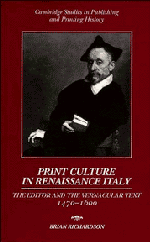Book contents
- Frontmatter
- Contents
- Preface
- Acknowledgements
- Abbreviations
- Note on transcription
- 1 Printers, authors and the rise of the editor
- 2 Editors and their methods
- 3 Humanists, friars and others: editing in Venice and Florence, 1470–1500
- 4 Bembo and his influence, 1501–1530
- 5 Venetian editors and ‘the grammatical norm’, 1501–1530
- 6 Standardization and scholarship: editing in Florence, 1501–1530
- 7 Towards a wider readership: editing in Venice, 1531–1545
- 8 The editor triumphant: editing in Venice, 1546–1560
- 9 In search of a cultural identity: editing in Florence, 1531–1560
- 10 Piety and elegance: editing in Venice, 1561–1600
- 11 A ‘true and living image’: editing in Florence, 1561–1600
- Conclusion
- Notes
- Select bibliography
- Index of Italian editions 1470–1600
- Index of manuscripts and annotated copies
- General index
9 - In search of a cultural identity: editing in Florence, 1531–1560
Published online by Cambridge University Press: 01 June 2011
- Frontmatter
- Contents
- Preface
- Acknowledgements
- Abbreviations
- Note on transcription
- 1 Printers, authors and the rise of the editor
- 2 Editors and their methods
- 3 Humanists, friars and others: editing in Venice and Florence, 1470–1500
- 4 Bembo and his influence, 1501–1530
- 5 Venetian editors and ‘the grammatical norm’, 1501–1530
- 6 Standardization and scholarship: editing in Florence, 1501–1530
- 7 Towards a wider readership: editing in Venice, 1531–1545
- 8 The editor triumphant: editing in Venice, 1546–1560
- 9 In search of a cultural identity: editing in Florence, 1531–1560
- 10 Piety and elegance: editing in Venice, 1561–1600
- 11 A ‘true and living image’: editing in Florence, 1561–1600
- Conclusion
- Notes
- Select bibliography
- Index of Italian editions 1470–1600
- Index of manuscripts and annotated copies
- General index
Summary
While venetian presses expanded and flourished in the middle third of the Cinquecento, printing in Florence was undergoing a crisis which saw the output of books and the quality of editing fall far below that of the 1520s. The roots of this crisis lay in the turbulence of the political and intellectual life of the city. In 1527 the Medici had been expelled and a new popular government had been formed. The ensuing conflict with the Pope (Clement VII, a member of the Medici family) and the Emperor Charles V had come to a climax in the heroic but unsuccessful defence of Florence against imperial forces in 1530. There followed the establishment of the Medicean duchy in 1532, the assassination of Duke Alessandro in January 1537, and the final defeat of the anti-Medicean rebels at Montemurlo later in the same year. These upheavals caused a haemorrhage of talent, one of the beneficiaries being Venice. Among the exiles who sought refuge there either briefly or for longer periods were four notable writers, Brucioli, Iacopo Nardi, Donato Giannotti and Benedetto Varchi. The Giunta press suffered badly in these years. In 1533 it suspended operations in Florence. Bernardo went to Venice to join his uncle Lucantonio, and Antonio Francini, one of his main classical editors, also left to work for the Venetian branch of the family. Only in 1537 did the Giunta presses in Florence begin to work again, but on a much reduced scale.
- Type
- Chapter
- Information
- Print Culture in Renaissance ItalyThe Editor and the Vernacular Text, 1470–1600, pp. 127 - 139Publisher: Cambridge University PressPrint publication year: 1994
- 2
- Cited by



